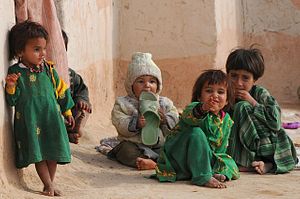War very often brings devastation. Wars kill, rip families apart, destroy bonds, and slay the very foundations of happiness. In countries where war is an ongoing part of life, the effects on people are myriad. The struggle to live takes a psychological toll. Events that would normally be major milestones are smothered by the conflict.
Consider, for instance, a family that welcomes a baby during a civil conflict. There is no official government to record the newborn’s date of birth. The family might write it on a piece of paper, but that piece of paper might later be destroyed in the war. This is not mere conjecture; it is the reality for Afghan society, and indeed in many countries that have experienced the tragedy of civil war: Vietnam, Sudan, Somalia, as well as Afghanistan.
Many Afghans who were born during the conflict of last four decades don’t know when their birthday is, and have instead been forced to choose random dates. A surprising number have chosen January 1, because it is easy to remember.
Ihsanullah, who is 26 and lives in Kabul, is one of those. “I still don’t know my exact date of birth so I decided to use January 1 on my official documents”
For outsiders, it might seem fascinating to have January 1 as your birthday, given that it coincides with the first day of the new year, but for Afghans it reflects the harsh reality of conflict, which has deprived them of knowledge of their real birthday. “Though I celebrate my birthday on January 1, in the back of my mind, I always feel that it is not my real date of birth and I do not feel well,” Ihsanullah says.
Weakened by conflict, government institutions have struggled to issue birth certificates or keep a well-documented record of new births. In urban areas, Afghans used to receive formal birth certificates from the appropriate government offices while in rural areas people used to record it in the Holy Quran and other religious books, part of the country’s Muslim culture. But civil war brought forced migration and internal displacement, and many Afghans lost track of their real birthdays.
The phenomenon has not escaped the notice of Afghanistan’s social media users.
When the Soviet Union invaded Afghanistan in 1979, kicking off a long period of conflict, millions of Afghans were forced to flee to neighboring countries, leaving behind everything they possessed.
The eventual defeat of the Soviets came at the cost of the lives of hundreds of thousands of Afghans, with millions widowed, orphaned, or disabled, and leaving Afghanistan devastated. The Afghan political leaders who followed the war were little better, fighting amongst themselves to capture more power to please their masters (those who supported them during the war), leaving Afghanistan as a failed state.
It is somewhat galling for Afghans to note that the fall of the Soviet Union, in which Afghanistan played a significant role, created independent Central Asian states that are today much better off than Afghanistan in many ways. While the youth of these states are active nationally and internationally, their counterparts in Afghanistan don’t even know their own birthdays.
Following the international intervention 13 or so years ago, Afghanistan’s health infrastructure has improved considerably. Hospitals in major urban cities now provide birth certificates on the spot, although there are still remote areas where a birth certificate is unusual.
Now, once again, international interest in Afghanistan is declining. Foreign aid is falling. There are fewer development projects, and few expats. Afghanistan is no more a favored topic for politicians and political scientists in the Western. Yet the insurgents remained a real threat, and Afghans don’t have a self-sustaining economy.
The West needs to realize that the war in Afghanistan was begun with a mutual interest: terrorism. Afghans have fought together with international forces on the frontlines against terrorism for 13 years. Tens of thousands of Afghans, including women, children, and the elderly have lost their lives over this period. Their sacrifice should not be forgotten, and the achievements of the last 13 years should not be lost. This can only happen through the sustained engagement of the West with Afghanistan.
Aziz Amin Ahmadzai is a writer based in Kabul. He tweets at @azeezamin786 can be reached by email at [email protected]. Ziauddin Wahaj has a postgraduate degree from University of Adelaide. He tweets at @wahajzia



































